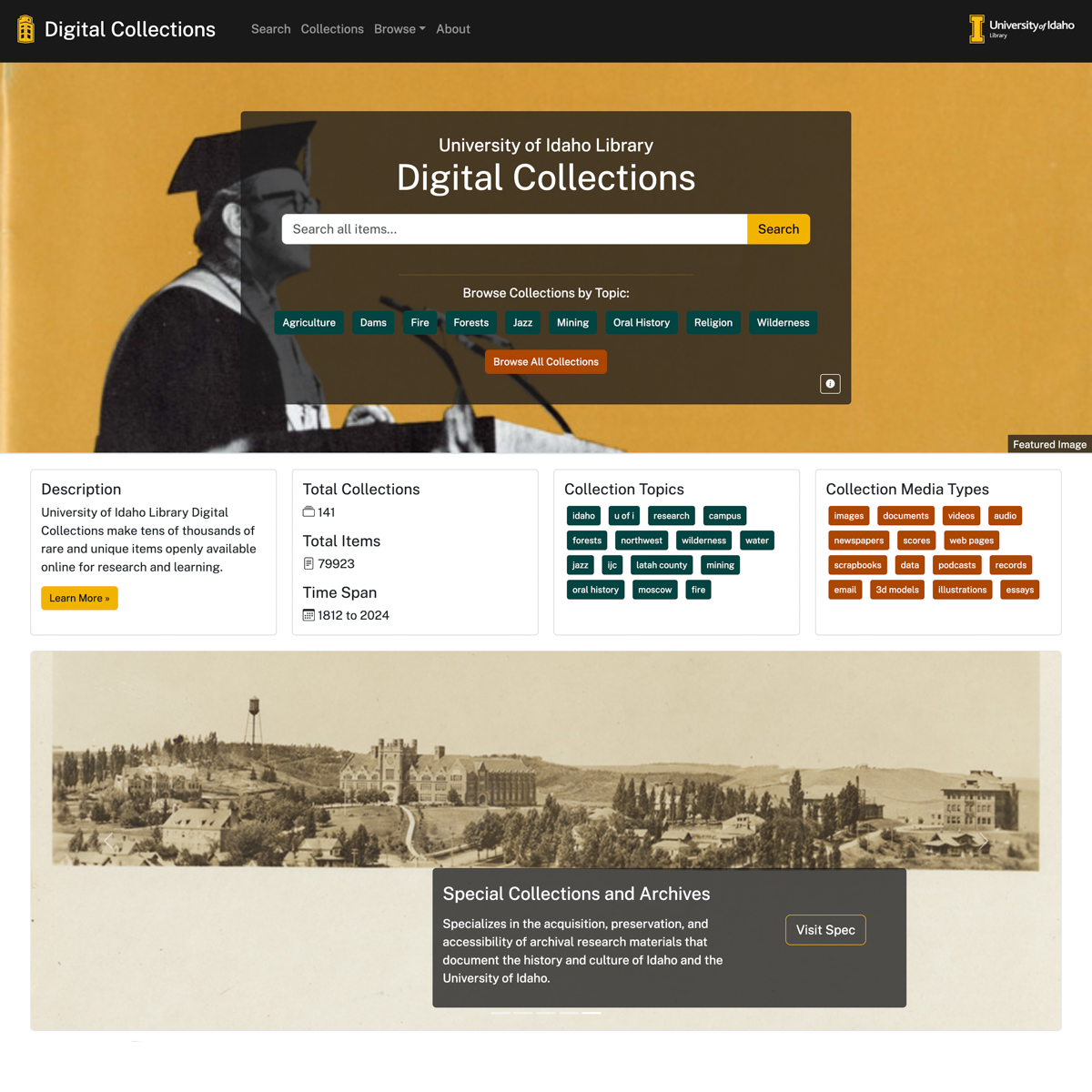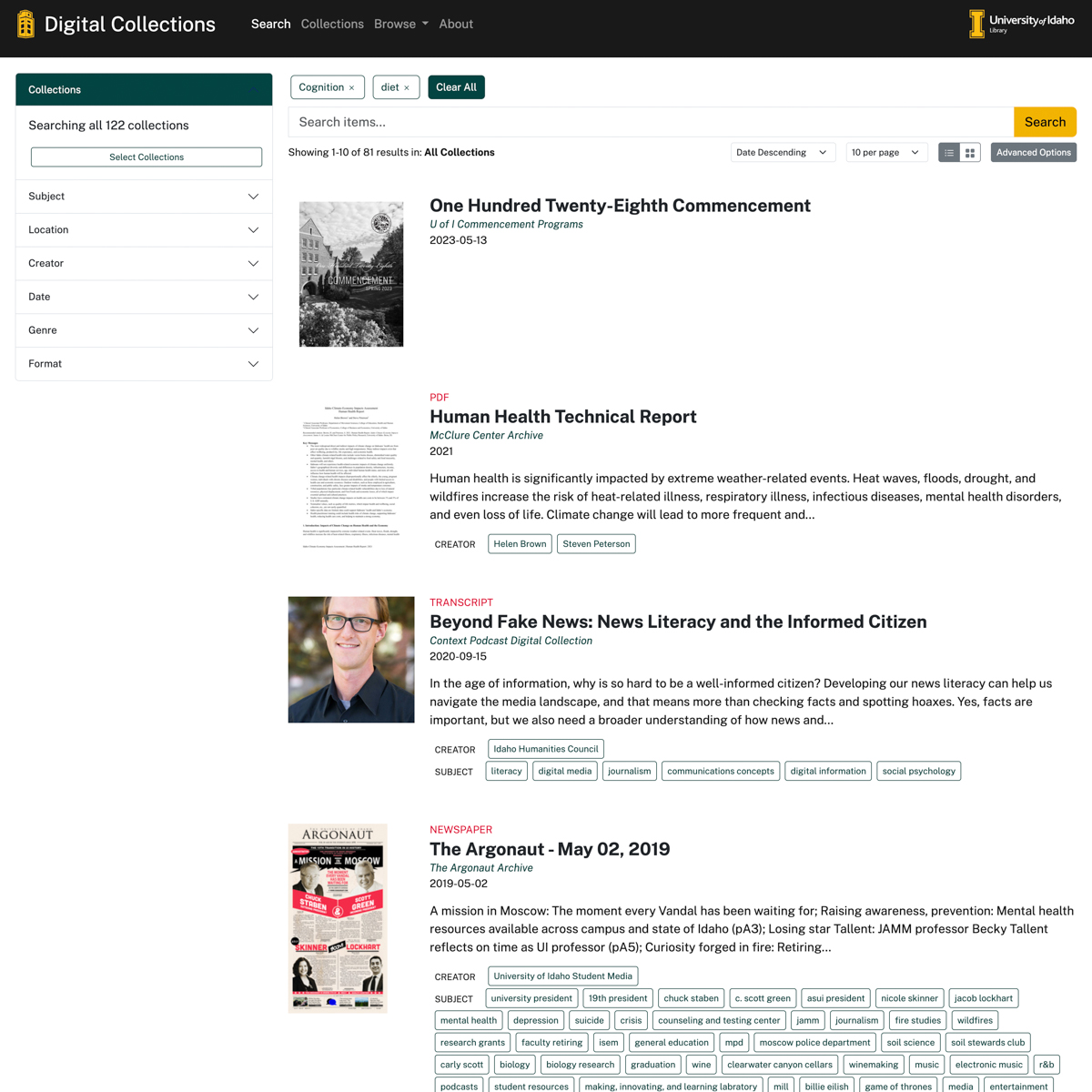Digital Collections and Additional Resources
U of I Digital Collections
Of course I also need to promote the digital collections that I work on along with the rest of the folks in Digital Scholarship and Open Strategies in the library! Think of this collection as a very small portion of our special collections holdings at the university, but with materials that are fully accessible online, with lots of contextual metadata about each item’s date, location, subject and authors.
All of the PDF files have a layer of transcribed Optical Character Recognition (OCR), so the contents of every archival document is keyword searchable within the main collection search page.
For example, this search of “diet” AND “cognition” brings up a diverse amount of material from archival newspapers, scientific research collections and even an oral history transcript that could be used to add context to your projects. At the moment, we maintain 140 digital collections containing nearly 80,000 documents, images, videos and audio files. Some collections that might be on interest to CALS students in particular:
- Agricultural Experiment & UI Extension Publications
- Primary sources for practical, research-based information on Idaho Agriculture, Forestry, Gardening, and Family and Consumer Sciences
- Idaho Waters Digital Library
- A collection of scientific and technical reports relating to water issues in key Idaho river basins
- Idaho Forest, Wildlife, and Range Experiment Station Collection
- UI-led research on topics ranging from Idaho’s forests and hydrology to rangeland, fisheries, and wildlife, published from 1954 to the present
- Rangeland Center Collection
- A repository of information related to topics in rangeland ecology and management
- Taylor Wilderness Research Station Archive
- Contains over 1000 scientific research papers produced at the refuge.
Databases
In addition to Academic Search Premier and Web of Science, here are a few more useful databases to find scholarly articles on dairy science:
- Agricola (Ebsco)
- Over 4.8 million citations to journal articles, monographs and theses
- CAB Direct
- Subjects covered include animal science, crop protection and plant science
- AGRIS
- AGRIS is an international cooperative system that provides citations to journal literature, theses and reports
As well as 238 more databases searchable on the library’s A-Z Databases resource.
Journals
The library subscribes to the following diary science journals, most of which are online, including:
As well as 300,000 more peer reviewed journals searchable on the library’s journal directory.
Print Books
One viable search strategy to find print books on a topic is stack browsing. That is to visit the library and locate the physical bookshelves to browse the book collections with a particular subject focus area using LC call number. For example, if you are interested in Dairy processing and Dairy products, you would want to look for call numbers that start with SF250.5-275. Other relevant call numbers include:
| SF1-1100 | Animal culture |
| SF94.5-99 | Feeds and feeding. Animal nutrition |
| SF191-275 | Cattle |
| SF221-250 | Dairying |
| QP1-(981) | Physiology |
| QP501-801 | Animal biochemistry |
Use the floor maps to locate the shelves that contain the specified call number groups.
Government Documents
When searching the library catalog, you can filter the results by Government Documents under Resource Type. These documents are located on the library basement. You can click this link or email Rami Attebury to learn more about how to access government documents.
You can use Google to search for government documents as well. Add site:gov at the end of your keyword search terms will yield results from government webpages. For instance, if your topic is on Mediterranean Diet and Cognition, you can search for site:.gov “Mediterranean” “Diet” AND “Cognition”.
Data and Statistics
If you are looking for contextual background information and overview of issue at stake for your presentation, consider incorporating some data and statistics from government centers. If you are looking for details on production, consumption, price, or standards of dairy products:
- USDA dairy market news
- Milk marketing order statistics
- USDA economic research service dairy data
- USDA dairy products grades and standards
- USDA dairy products monthly production data
- USDA census of agriculture
- USDA National Agricultural Statistics Service
For Iron and Fetal/Infant Neurodevelopment:
- WHO: Guideline on Iron Supplementation in Infants and Children
- NLM PubChem / NIH: Iron and Neurodevelopmental Outcomes Data
For Mediterranean Diet and Cognition
- Harvard T.H. Chan School of Public Health: Mediterranean Diet Research
- WHO: Healthy Diet and Cognitive Function
Citation
Finally, I would recommend using a using a citation manager once you do find the materials you need. It is an incredibly helpful way to organize all of your research material, create and store annotations, generate bibliographies and then export this material for future preservation. Watch the following library workshop on Citation Management with Zotero below, or visit my open educational resource on the platform that will walk you through every step of the process you need.
Please always feel free to reach out about any library resources I’ll be discussing in this workshop at aweymouth@uidaho.edu!
Please always feel free to reach out about any library resources I discussed in this workshop at aweymouth@uidaho.edu!
Also:
Library Reference
If you have any more general questions about using the library, finding resources for research papers and projects, creating effective research strategies, and managing citations:
Visit Email Call 208-885-6584 24/7 Chat Text 208-449-0841About the Author
Andrew Weymouth is the Digital Initiatives Librarian at University of Idaho, primarily focusing on static web design to curate the institution’s special collections and partner with faculty and graduate students on fellowship projects. He has also created digital scholarship projects for the universities of Oregon, Washington and the Tacoma Northwest Room archives, ranging from long form audio public history to architectural databases and network visualizations. He writes about labor, architecture, underrepresented communities and using digital scholarship methods to survey equity in archival collections.

